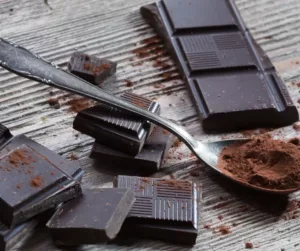There’s no magic pill to reverse hearing loss, but the right foods for hearing health can slow its advance. Your choice of foods directly impacts not only your hearing but also your overall well-being. A balanced diet rich in crucial nutrients can stave off further ear damage and promote overall auditory health.
Hearing depends on the flow of oxygen-rich blood to the inner ear’s delicate cells. These cells translate sound waves into signals for the brain. Poor circulation harms these cells, echoing the detrimental effects on your heart. Stay tuned to unlock the secrets of a hearing-friendly diet.
Discover more about age-related hearing loss.
Top Ten Foods For Hearing Health
Beyond lifestyle diets like the Mediterranean, specific foods teeming with vital nutrients can also safeguard your auditory health. Let’s delve into the top 10 foods for hearing health that can fortify your ears and overall well-being.
-
Dairy Delights: Milk and More
Milk isn’t just a staple; it’s a treasure trove of vitamins like A, B, D, E, and K. These vitamins optimize metabolism and act as antioxidants. Minerals like magnesium, potassium, selenium, and zinc regulate inner ear fluid, which is vital for hearing health.
-
Garlic: The Natural Healer
Garlic serves dual roles in lowering cholesterol and fighting inflammation in your ears—better circulation results, facilitating improved hearing functions.
-
Whole Grains: Nutrient-Packed Staples
Whole grains, rich in magnesium, fortify the nerve functions in your inner ear. Exposure to loud noises often damages the inner ear; whole grains can offer a layer of protection.

-
Dark Chocolate: A Sweet Symphony
Besides satisfying your sweet tooth, dark chocolate is high in zinc, boosting immunity and cell growth in the ears. However, consult a physician if you have health conditions that limit its consumption, like diabetes.
-
Bananas: Potassium Powerhouse
These magnesium-rich fruits improve blood circulation and oxygen supply in the inner ear. Bananas regulate levels of glutamate, a significant factor in hearing loss among seniors.
-
Cantaloupes: Melon Magic
This juicy fruit brings potassium into play, helping regulate cochlea fluids. The cochlea is an essential organ for hearing, and its well-being is crucial.
-
Fish Feast: Omega-3 & Vitamin D
Regular servings of fish like salmon and tuna offer rich Omega-3 and Vitamin D. These nutrients strengthen inner ear bones and improve brain-ear coordination, effectively preventing hearing loss.
-
Citrus Fruits: The Vitamin C & E Medley
Oranges, grapefruits, and other citrus fruits are packed with vitamins C and E, acting as antioxidants and cell protectors against hearing loss and ear infections.
-
Dark Green Veggies: Folate & More
Spinach, broccoli, and kale contain not just folate but also Vitamins K and C, along with potassium and magnesium. These nutrients combat free radicals that could harm the sensitive inner ear tissues.
-
Eggs: A Vitamin D Haven
Eggs aren’t just a breakfast staple but a vitamin D powerhouse. Regular consumption could significantly lower your chances of hearing problems.
Incorporating these top 10 foods for hearing health into your daily diet can go a long way in preserving your auditory well-being. Mix and match them to make your meals both delicious and ear-friendly!
Vitamins and Minerals That Help Your Hearing
Now that we’ve explored foods promoting hearing health let’s focus on the specific vitamins and minerals that make these foods beneficial.
The Role of Antioxidants
Antioxidants fight oxidative stress, a leading cause of age-related hearing loss. Found in brightly colored fruits and vegetables like bell peppers, these compounds can help maintain optimal ear health.
Foods Rich in Zinc
Zinc plays a vital role in maintaining the health of your inner ear. A zinc deficiency can lead to tinnitus, a constant ringing in the ears. Foods like beef, lentils, and dark chocolate are excellent sources.
Vitamin C
Primarily known for boosting the immune system, vitamin C can also safeguard your hearing. However, excessive vitamin C supplements can be counterproductive, increasing the risk of hearing loss.
Iron and Hearing
Anemia, resulting from iron deficiency, can impair blood flow to the cochlea, affecting hearing. Sources of iron include beef, salmon, and tofu.
Potassium’s Role
Potassium regulates inner ear fluid levels, which is critical for translating noise into brain signals. As we age, these levels drop, leading to presbycusis or age-related hearing loss. Avocados, beans, and potatoes are good sources.

Folate: More Than Just a Vitamin
Folate contributes to new cell growth and blood circulation, particularly in the inner ear. Foods like spinach, broccoli, and asparagus are rich in folate.
Magnesium: The Protector
Magnesium shields the inner ear’s hair cells, especially when exposed to loud noise. Include bananas, spinach, and broccoli in your diet for adequate magnesium intake.
Vitamin B12: Don’t Forget Balance
This vitamin aids not just hearing but also balance. Meat, eggs, and dairy are prime sources, making it crucial for vegetarians to seek foods fortified with vitamin B12.
Opt for nutrient-dense foods over supplements, as natural sources provide a well-rounded nutrient profile. Incorporate these nutrients into your diet, and not only will your heart and body thank you, but your ears will, too.
Explore more ways to protect your hearing.
Foods To Avoid to Protect Your Hearing Health
To protect your hearing and possibly alleviate symptoms like tinnitus, be mindful of the following foods and habits that can negatively impact your auditory health.
- Unhealthy Fats: Steer clear of vegetable oils rich in Omega 6 fatty acids; opt for Extra Virgin Olive Oil or Canola Oil, which are Omega 3-rich. High-fat meats, especially those treated with preservatives like nitrates and nitrites, can negatively impact hearing.
- Sugar and Sweeteners: Limit your intake of sugar and artificial sweeteners. Consider healthier alternatives like Stevia, honey, or real maple syrup.
- Refined Carbohydrates: Avoid foods with “enriched” flour, such as white bread and pasta. These refined carbs lack essential nutrients and can impair hearing.
- Sodium: Sodium is essential in small quantities, but an excess can harm your hearing. Be cautious of packaged and processed foods, which often contain excessive sodium.
These foods may not necessarily damage your hearing, but they can exacerbate tinnitus symptoms:
- High-Cholesterol Foods: Opt for a plant-based diet to get your fats from healthier, unsaturated sources.
- Carbohydrates: Regulate carbohydrate intake throughout the day to stabilize blood sugar levels.
- Caffeine: Although its role is not clear-cut, caffeine can trigger tinnitus symptoms due to its diuretic and stimulant properties.
- Salty and Salicylate-Rich Foods: Salty snacks, cheese, and alcohol can worsen tinnitus, especially for those with food allergies or sensitivities to foods containing salicylates, like tomatoes and berries.
By avoiding or moderating these foods and habits, you can better manage your hearing health and alleviate tinnitus symptoms.
Understand more about types of tinnitus.

Proactive Steps for Healthy Hearing
The right foods can positively influence your hearing, while others might exacerbate issues like tinnitus. A balanced diet rich in essential nutrients boosts your overall well-being and protects your ears. Don’t hesitate to act if you’re concerned about your hearing health. Schedule a comprehensive hearing evaluation with American Hearing and Audiology today. Your ears will thank you.



